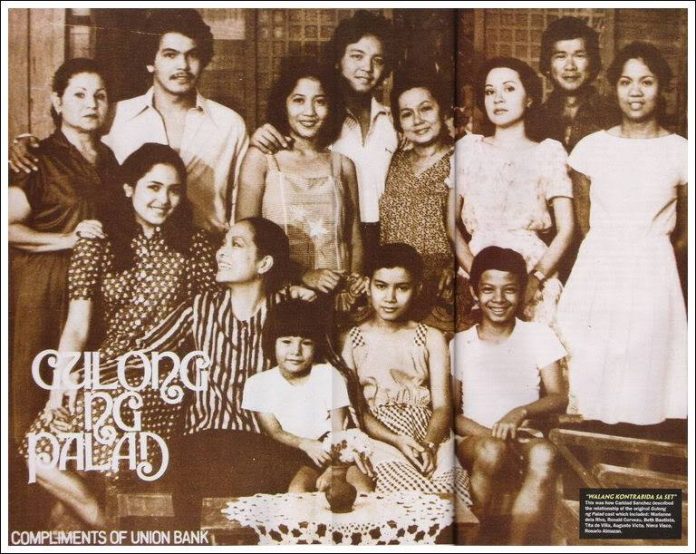One of the earliest telenovelas produced on Philippine television was entitled GULONG NG PALAD, in English: THE WHEEL OF FORTUNE, back when actors like Romnick Sarmenta were still children.
The show apparently enjoyed very high ratings because of the many heart-rending tearjerker scenes of underdogs being oppressed but eventually getting vindicated when the wheel of fortune turns to their advantage. Listen to what the theme song of that telenovela says,
Kung minsan ang takbo ng buhay mo
Pagdurusa nito’y walang hanggan
Huwag kang manimdim
Ang buhay ay gulong ng palad (2x)
Ang kandungan, ang kapalaran
Kung minsan ay nasa ilalim,
Minsan ay nasa ibabaw…
In English, its says: “When your life seems like a never ending chain of miseries, don’t despair, life is but a wheel of fortune, such is fate when it falls on your lap, sometimes you’re up above, sometimes you’re down below.”
In a parish recollection, after quoting this song, I asked the people if they believed that life was a wheel of fortune. I was taken aback when they answered yes, almost in unison.
Because I was surprised, one of them posed back the question to me, “You don’t believe it’s true, Bishop?” I said, “Of course, I don’t. It is too fatalistic. It’s practically like saying there is no God. Things are just automatic, sometimes you’re up, sometimes you’re down.”
Today’s Gospel actually sounds like Gulong ng Palad. The Lord says, “Blessed are you who are now hungry, for you will be satisfied. (But woe to you who are satisfied now, for you shall be hungry.)
Blessed are you who are now weeping, for you will laugh. (But woe to you who laugh now, for you shall weep.)”.
Unlike in St. Matthew’s Gospel where we encounter the more popular eight beatitudes, in St. Luke, you have them divided equally into two groups of four statements. On the one hand, you have four blessings or beatitudes, and on the other hand, the four corresponding curses or maledictions. Each line in the second set is actually reversing the statements in the first set from a blessing to a curse.
But how come I disagree with the thought that Luke is just following the same superstitious concept of the wheel of fortune turning upside down and downside up? Because these blessings and curses are found in the same Gospel that gave us the famous Canticle of Mary known as the Magnificat. There, Luke portrays Mary pronouncing an oracle of hope or salvation about a coming time, when the Almighty will “cast down the mighty from their thrones” and will “lift up the lowly”, when he will “fill the hungry with good things and the rich he will send away empty.”
You would surely remember that I have shared some thoughts on this already. Even José Rizal had raised this issue in his EL FILIBUSTERISMO when he said, “Why independence, if the slaves of today will be the tyrants of tomorrow?” It means for as long as the oppressed simply imitate the consciousness of their oppressors, you cannot call it a revolution.
For as long as the people remain in a kind of persecution complex that can imagine change as nothing short of a mere reversal of fortunes, there is no way they can grow from victims to victors. St Luke is actually not original with the words uttered by Mary in her Magnificat. He borrows most of the lines from the song of Hannah, the mother of Samuel, in 1 Samuel 2:4-5, 7-9. Since it is stated more elaborately in 1 Samuel, let us quote it from there:
“The bows of the mighty are broken, while those who are weak gird on strength. The well-fed hire themselves out for bread, while the hungry no longer have to toil… The LORD makes poor and makes rich, he humbles and also exalts. He raises the needy from the dust; from the ash heap lifts up the poor; To seat them with nobles and make a glorious throne their heritage.“
Will the Lord put down the mighty from their high position and lift up the lowly, in order to reverse their situations? Is it his desire to make the oppressed of today into the oppressors of tomorrow? No. Listen, the Lord lifts up the poor in order to “seat them with nobles and make a glorious throne their heritage..” What He desires is to put them on level ground with each other, no longer as masters and slaves but as brothers and sisters, as people who are equal to each other in dignity.
The oppressed, not doubt, are dehumanized by their state of oppression. But their oppressors, by being cruel and merciless, are not any less dehumanized than their victims, by their very cruelty and inhumanity. It is from that position that they are being CAST DOWN, while their victims are lifted up, so that they could be seated next to each other; so that they can see eye to eye with each other.
Last month it was made public that Pope Francis is releasing a new social Encyclical soon. Apparently, the social teachings that he is laying out in this encyclical are his most radical thoughts, by far. Apparently he does not mince words in calling attention to the glaring and scandalous disparities that have been brought about by the global and national economic systems that are now breaking down because of the Covid 19 pandemic. He is calling on the world to take the present crisis as a perfect opportunity for a conscious resetting of the global socioeconomic order in a manner that is more just, more humane, more spiritually grounded, and mindful of the poor and of the environment.
The “Wheel of Fortune” is a homily delivered by Bishop Pablo Virgilio David on Sept. 9, 2020, Wednesday of the 23rd Week in Ordinary Time, Lk 6:20-26









